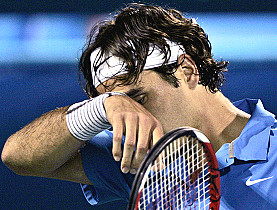
Federer blames illness for bad form

Swiss tennis star Roger Federer says a bout of mononucleosis - glandular fever - accounts for why he had a bad start to the year.
The world number one lost to eventual champion Novak Djokovic in the Australian Open semi-finals in January and crashed out in the first round of the Dubai Tennis Championships last week.
Federer had not played between the Australian Open and the Dubai game, which he lost to Briton Andy Murray. It is the first time since 2004 that he has gone out in the first round of a tournament.
In a statement posted on his website on Saturday, Federer said he had been diagnosed with glandular fever, a virus whose symptoms include fever, a sore throat, and swollen lymph glands, during a stay in Switzerland.
The 26-year-old Swiss, who has spent a record 214 consecutive weeks at the top of the men’s rankings, said he started to feel unwell at the end of last year and was unable to play at the beginning of January. This affected the Australian Open.
“During the time in Melbourne I felt slow and kept looking for possible reasons for that – without finding an answer,” Federer wrote.
“Some time later, during my holidays in Switzerland, I became severely ill again. I went to the hospital straightway to get further tests done. And it was this time that they found out what was bothering me all along: mononucleosis. I had had it for six weeks already, meaning it would normally be over.”
Federer said he was relieved to know what had caused him to feel so weak in Australia.
Fitness issues
“The bad news is that I have quite some catching up to do in terms of fitness as I am not in the physical state that I would normally be in at this time of year,” he said.
Federer said that he has known for ten days that the illness was over. He has been exercising at maximum level since then, which meant that he only had around three days of intense training before Dubai.
He said that the match against Murray had been a good once under the circumstances, but also praised Murray for playing an excellent match.
The player added that his physical coach had been assisting him and that he was already feeling stronger again.
But Federer said that he would definitely need more training for the Indian Wells tournament after the match against Pete Sampras in New York.
The Swiss plays exhibition match at Madison Square Garden on Monday night. Federer has 12 Grand Slam titles, two away from Sampras’ own career record.
“The main issue now is to get 100 per cent fit and make up for all the training I missed out on,” Federer said.
swissinfo with agencies
Glandular fever is common during childhood, particularly adolescence. It often lasts a week or two, but can lead to complications.
It is caused by the Epstein-Barr virus. This group of viruses also includes varicella which causes chicken pox. Once infected, the virus remains dormant in the body’s cells for the rest of a person’s life.
Because glandular fever is a viral infection, there is no specific treatment. Around half of all people who have glandular fever get an enlarged spleen. Glandular fever may also lead to hepatitis (inflammation of the liver), which can cause temporary jaundice.
Age: 26
2007 match record: 68-9
2007 singles titles: 8
Career singles titles: 53
Grand slam titles: 12 – Australian Open (2004, 2006, 2007), Wimbledon (2003, 2004, 2005, 2006, 2007), US Open (2004, 2005, 2006, 2007)

In compliance with the JTI standards
More: SWI swissinfo.ch certified by the Journalism Trust Initiative
















![The four-metre-long painting "Sonntag der Bergbauern" [Sunday of the Mountain Farmers, 1923-24/26] had to be removed by a crane from the German Chancellery in Berlin for the exhibition in Bern.](https://www.swissinfo.ch/content/wp-content/uploads/sites/13/2025/12/01_Pressebild_KirchnerxKirchner.jpg?ver=cb688ed5)














You can find an overview of ongoing debates with our journalists here . Please join us!
If you want to start a conversation about a topic raised in this article or want to report factual errors, email us at english@swissinfo.ch.